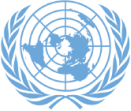Mr. president,
First, 100 years since the beginning of the First World War, the atmosphere surrounding international relations is not promising. It does not give the impression that the States involved in that war learned anything from the history of that catastrophe, since the First World War was followed by the Second World War, which was more destructive and more painful.
The same policies now seem to govern most international relations, leading towards chaos and what could be called a third world war waged by the same colonial States in the same spirit of opportunism. However, this time, the agents are present in many conflict zones around the world.
Regrettably, the establishment of the United Nations did not lead to the noble goal for which it was created — to save succeeding generations from the scourge of war, as is stated in the preamble to the Charter. Our peoples, whose voices joined those of the peoples of the United Nations in calling for the condemnation of war and for the prevention of its scourge on humankind following the Second World War, have suffered more than ever before from the effects of wars that have caused great harm to the world, in particular our Arab region, and that we still feel today. In our history, the suffering of our peoples has redoubled owing to the ongoing armed aggression and the various forms of armed military invasion, especially against Syria, Iraq, Libya and Gaza.
It is truly ironic that the end of the First World War in Europe was followed directly by the painful path of European colonial wars against other peoples. As soon as the weapons of war fell silent in that war, the Governments of France and Britain drafted the Sykes-Picot Agreement. It was a deplorable agreement that divided the States and peoples of the region into areas of influence and occupation and opened the way for the Balfour Declaration of 1917, which sowed Zionist settler colonization in occupied Palestine and led to the unprecedented injustice and Israeli settler occupation of Arab and Palestinian land that continue today. The Sykes-Picot Agreement also opened the way for the French occupying authorities that took Iskenderun from the lands of the Syrian Arab Republic and handed it to Turkey, which still occupies it today, in order to bribe Turkey’s then-rulers not to enter the Second World War on the side of Nazi Germany.
What many States see in the crises in the Arab region compels us to question who benefits from such crises. That is particularly the case given the fact that we have seen organized and coordinated actions in our Arab region by many States, one after the other, with the same participating States and regional and local actors using the same tools, slogans, schemes and resources, leading to the killing of millions of innocent people and destruction on a unprecedented scale.
The peoples of the region are paying the price of the military invasion of Iraq in 2003, which took place following unilateral claims that were rejected by the Security Council and the Secretary-General at the time. That led to the tragedies of which we are all aware. The Libyan people are also paying the price of direct military intervention, which has destroyed the country and put it in the hands of armed groups and Takfiri gangs that threaten the peace and security of every Libyan. We have now seen terrorists and weapons sent to my country, Syria.
Perhaps it is time to talk about the destruction of the State in Somalia and in other African States. The United Nations is called on to bear its responsibilities and to discharge the role entrusted to it by the States Members of the United Nations under international law and the Charter of the United Nations, in particular with regard to equality, sovereignty and non-intervention. The maintenance of international peace and security and preventive action to stop conflicts and to achieve their settlement are not limited to vying to condemn terrorism and to justify it with expressions such as “spring”, “revolution”, “popular uprising” and “peaceful movements”. There is a clear policy of double standards in the Organization that continues to frustrate the hopes of our peoples.

